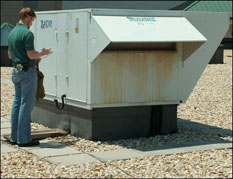 |

|
 |
A CEEE researcher performs an energy audit of the heating and cooling system on the roof of the Whole Foods Supermarket in Silver Spring, MD. |
|
Mechanical engineering graduate students performed an 'energy audit' this fall for two buildings in Maryland as part of their Energy Efficiency and Conservation independent study. An energy audit is the first step to assess how much energy a building consumes and to evaluate what measures can be taken to make the building more energy efficient. The audit reveals problems that may, when corrected, save significant amounts of money over time. During the audit, energy systems engineers pinpoint where a building is losing energy. These audits also determine the efficiency of a building's heating and cooling systems, and may also show ways to conserve hot water and electricity.
Cara Martin, Jon Schoenfeld, Magnus Eisele, Ethan Lust, and Billy Grayson conducted energy audits for the Woods Memorial Presbyterian Church in Severna Park, and for the Whole Foods Supermarket in Silver Spring this summer. During the Woods Church audit, Center for Environmental Energy Engineering (CEEE) faculty research assistant Jan Muehlbauer and undergraduate intern Matt Huffman also provided support. These audits were part of the independent study course ENME 808W: Energy Efficiency and Conservation, put together by CEEE Director Dr. Reinhard Radermacher, and Director of Mid-Atlantic CHP Application Center Dr. Joe Orlando, also of the CHP/IES System Integration Research Program Consortium. The course and requisite project studies help complete the graduate Energy Systems Engineering coursework.
"We looked for elements in the church and supermarket that were contributing to excessive energy costs and usage, examining the mechanical systems, building lighting, and any other features that could be improved to reduce energy consumption. A number of recommendations were made for both cases which included cost analyses and energy savings," says project leader Cara Martin.
The Director of the Woods Memorial Presbyterian Church, Thomas Lerario, has already implemented many of the short-term recommendations from the audit report, including the replacement of compact incandescent light bulbs with floursescent ones, and a motion sensing on/off switch for utility rooms - changes which are expected to save $15,000 in utility costs annually. Future energy-saving projects include isolating the climate-controlled area around the church?s organ pipes to a smaller volume, replacing old doors and windows, and installing solar parking lights in the parking lots.
November 1, 2007
|

